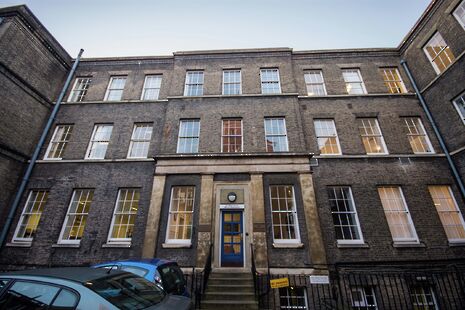Referendum passes to create CUSU Disabled Students’ Officer
Following the referendum result, CUSU reacts to the prospect of creating a new sabbatical position

Results for the Disabled Students’ Officer referendum show it has been a success for the Yes campaign, with 4,315 for and 336 against.
The referendum on the creation of a full-time Disabled Students’ Officer for Cambridge University Students’ Union (CUSU) saw a 92.22 per cent vote for the Yes option, with 4,679 votes cast. This comprised a 21.4 per cent total turnout.
The referendum ran from Wednesday 27th January until 9am on Wednesday 3rd February.
It proposed adding the role of Disabled Students’ Officer (DSO) to the six current sabbatical officer roles: President, Education, Welfare, Women’s, Coordinator and Access.
The first DSO will be elected by “all those ordinary members who self-define as disabled”. This would operate in a manner similar to the election for Women’s Officer, whose electorate consists of self-defining women.
The DSO will operate as head of the autonomous CUSU Disabled Students’ Campaign. They will work full-time and be paid £20,000 a year, the same salary as other elected CUSU officers.
In a statement, Jemma Stewart, CUSU Co-ordinator and Returning Officer for the referendum, said: “CUSU Elections Committee would like to take this opportunity to thank all those students who voted in what is now the highest voter turnout in a CUSU referendum in over 6 years.” She said the high turnout was “in no small part down to the excellent campaigning techniques and dedication of those involved.”
Implementation will now be handed over to the Union Development Team – composed of CUSU President Priscilla Mensah, Cornelius Roemer and Umang Khandelwal.
The referendum question was phrased “Do you accept the proposed constitutional changes, which would add a Disabled Students’ Sabbatical Officer to the CUSU Full-Time Elected Officer Team?”, with “Yes” and “No” as the responses. It was run under tight rules for campaigning and social media. This included a blanket ban on any posts which advocated either voting option from public social media groups, including JCR and MCR pages.
The official Yes guidance offered by CUSU Elections Committee said that the creation of a full-time DSO would be a “positive step for greater equality and liberation” within the university. They said that a student elected into this role could “feed into general discussions on whole-team Sabbatical Officer campaigns with both personal and representative experience much more easily”.
It was also suggested that the creation of the new role will “set a precedent for other Students’ Unions” around the UK, as full-time officers for disabled students are currently a rarity.
Speaking to Varsity about whether CUSU could afford the DSO, President Priscilla Mensah said that the referendum had to be “separate from the practical questions as to how it can be implemented”.
She also said that how quickly the position could be created “depends on the university’s response to us going forward and showing them the formal results of the referenda”.
When questioned about whether the entire sabbatical team was behind the result, she said: “Yes, because it’s the result. The result is the result”, adding that she thinks “everyone’s happy with it because... I think I speak for everyone when I say we’re delighted about the extent to which students engaged with the referendum”.
“The result is just a real testament to how we can democratically engage students, and that’s a real delight. I think we potentially have different views on how representation works and what it looks like, but I think we’re all behind the fact that disabled students of course deserve great representation”, she added.
Reacting to the outcome of the referendum, a spokesperson for the Yes campaign said: “This is a huge victory. We hope that we can build on this support and mobilise more students to get involved with the Disabled Students’ Campaign, and we will continue working relentlessly to make Cambridge a less disabling place. [...] We want to thank every single student who took the time to vote and engage with the campaign.”
Concerns were raised about the value for money that a full-time Disabled Students’ Officer would offer. The CUSU guidance for the No campaign stated that an “additional full-time officer would increase the demands on staff support, which may consequently result in a need for more roles within the support staff team”, and stated that this could have its own “financial implications”.
Options proposed by CUSU to fund the newly created post include “ceasing existing activities” and “looking to raise additional income”. CUSU is currently in the early stages of pursuing a general re-negotiation of its funding model – seeking to gain money directly from colleges rather than from JCRs and MCRs. This new approach has received mixed responses.
The vote was triggered by a petition held by the Disabled Students’ Campaign at the end of last term, which gained the 350 signatures required to trigger a referendum.
According the university’s Equality & Diversity Information Report for 2014-15, “numbers of students who have diagnosed a disability continue to rise”. 8.1 per cent (968) of undergraduates and 5.9 per cent of (497) graduates disclosed a disability in 2014-15.
 News / Uni Scout and Guide Club affirms trans inclusion 12 December 2025
News / Uni Scout and Guide Club affirms trans inclusion 12 December 2025 News / Cambridge Vet School gets lifeline year to stay accredited28 November 2025
News / Cambridge Vet School gets lifeline year to stay accredited28 November 2025 Science / Did your ex trip on King’s Parade? The science behind the ‘ick’12 December 2025
Science / Did your ex trip on King’s Parade? The science behind the ‘ick’12 December 2025 News / Cambridge study finds students learn better with notes than AI13 December 2025
News / Cambridge study finds students learn better with notes than AI13 December 2025 News / Pembroke to convert listed office building into accom9 December 2025
News / Pembroke to convert listed office building into accom9 December 2025








